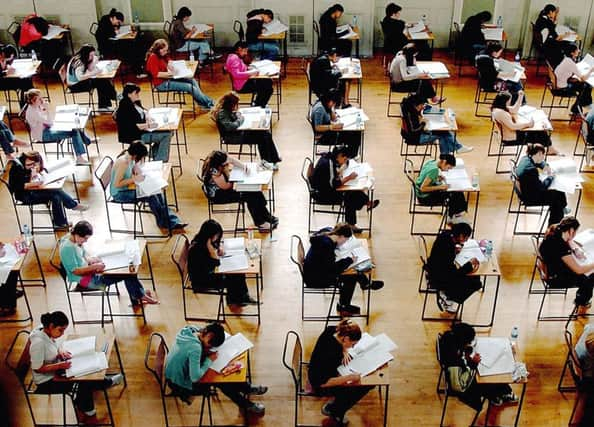Here’s how to get help with exam stress


As a sad consequence, Childline revealed it delivered 12,995 counselling sessions to children in 2017/18 for education-related problems,
Reports also show that the age of children most likely to be counselled for exam stress is between 12 and 15-years-old and that 50 per cent of children establish some strain of a mental health problem by the time they’re 14.
Advertisement
Hide AdAdvertisement
Hide AdYoung people contacting Childline say that exam stress has led to:
Depression and anxiety;
Panic attacks;
Low self-esteem;
Self-harming and suicidal thoughts;
Worsening of pre-existing mental health conditions.
With GCSEs looming, the Easter holidays are a time when revision is critical. But how can parents help to combat exam stress and the potential mental health implications whilst still helping their child to achieve their potential?
“It’s all about finding the right balance,” says Rob Kerrison, of national education brand, Tutor Doctor. “GCSEs make it necessary to put in hours of revision over the Easter break, but that doesn’t mean your child’s mental health has to suffer. There are practical ways to help them create a balanced way of learning, without being left overwhelmed and, crucially, still be able to enjoy the festivities.”
Here are Tutor Doctor’s top tips for protecting children from stress during Easter revision:
1.Plan in social events:
Advertisement
Hide AdAdvertisement
Hide AdCreating your social calendar is equally as important as blocking out time for revision. It’s all about creating the right balance, finding what works for your child whilst focusing on a sense of wellbeing at the same time.
Spontaneity is great but when it comes to revision, sticking to a plan is key. Having social timings planned, either as a family or with friends, and then crucially, sticking to them, forms a vital part of any learning schedule.
2. Create a revision timetable:
Once you’ve clearly marked a calendar with any social activities, you can then organise revision times in blocks and by subject/category. That way, everyone can see what children are meant to be doing at a specific time – meaning you, and they, can be strict on getting down to work. Far from being draconian, this method promotes productive study-time and allows for guilt-free down time too!
3. Take regular breaks:
When blocking out revision time, it’s important to schedule breaks too. Students need to allow their brains to rest for a while, so it can continue to retain information effectively. Similarly, knowing when to stop is crucial. Getting to bed at a reasonable time and switching off on revision heavy days is key.
4. Prioritise workload:
Advertisement
Hide AdAdvertisement
Hide AdUsing a red, amber and green system can help your child prioritise their work in a way that becomes manageable. Red means feeling clueless, amber means having some idea but needing a little refresher and green means they’re comfortable and confident in that area of knowledge. This simple traffic light system can help to create a clear schedule for revision by indicating how much time students need to spend on each specific subject.
5. Keep study varied:
Sometimes, there’s nothing worse than being stuck in front of a computer screen or notepad, away from the festivities. Especially when the house is filled with the sounds and smells of the holidays. Mix up your child’s learning method to keep their brain active and engaged: switch from revision cards to mind maps or introduce brain exercise games so they don’t become stagnant. Bring learning to the party every now and then by getting members of the family to assist with test questions and readings. Revision doesn’t have to be boring!
6. Stop comparing yourself to others:
This is one of the biggest setbacks when it comes to progression. Constantly comparing themselves to others will hinder your child’s performance in a way that could be detrimental. Encourage and support them by reminding them that everyone is different and that extends to learning styles too so, what works for their friends, may not work for them. And try to remember and communicate to your child that, whilst important, exams don’t determine who they are as a person.